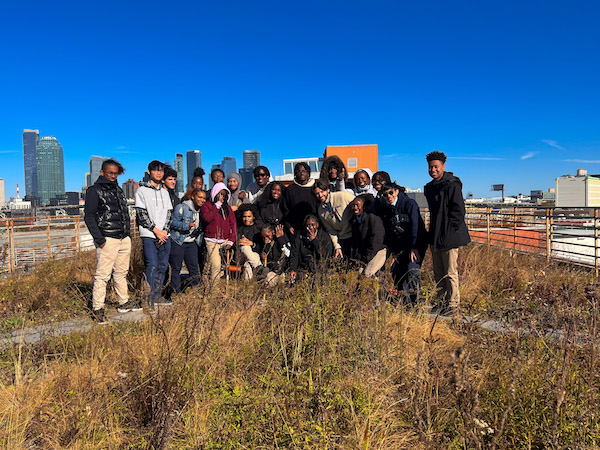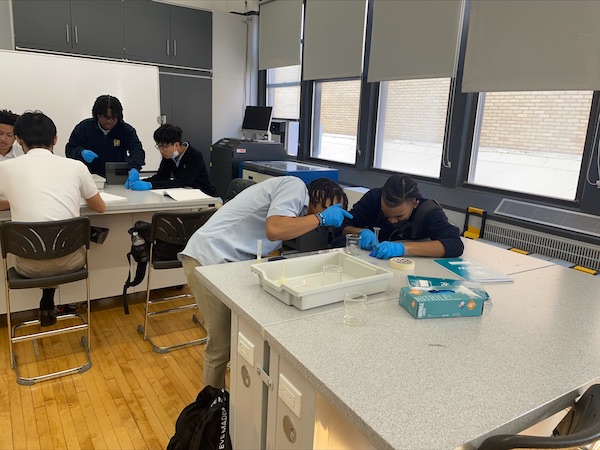
FORT GREENE — When it comes to climate change, and whether or not Americans believe it’s a serious issue, Catholics are bucking a national trend, a recent survey reveals.
According to a Pew Research Center survey, highly religious respondents — those who regularly attend services and consider faith to be a central part of their daily lives — are far less likely to be worried about climate change than people who are not as religious.
For example, while 57% of U.S. adults overall believe that climate change is a serious concern, only 42% of people who identify themselves as highly religious share that belief about global warming. And only 34% of evangelicals hold that view.
However, the survey, which was conducted in April, found that 57% of Catholics believe that climate change is a serious issue. That matches the national average.
It also shows that large numbers of Catholics are in line with the sentiments Pope Francis expressed in his 2015 encyclical Laudato Si (Praise Be) which was subtitled “On Care For Our Common Home.” The Holy Father called on the people of the world to take swift action to protect the environment.
According to the survey, politics plays a role in why some do not view climate change as a serious problem. “The main driver of U.S. public opinion is political party, not religion,” the report states. Many deeply religious people lean Republican, and Republicans are much less likely to consider climate change as worrisome.
But there are other factors determining the views of deeply religious people, the survey found. For example, respondents replied that they believe there are other more serious problems facing the world and that God will take care of the planet.
In the meantime, students at Bishop Loughlin Memorial High School in Fort Greene are taking the pope’s Laudato Si message seriously.
“Just being a Catholic school, there’s concern for each other and concern for the planet is of course important as well,” Science Department Chairman Orlando Santiago said. “One of our school mottoes is ‘Enter to learn, leave to serve.’ So I think service and our environment both go hand in hand.”
In November, Science teacher Micah Effron led the students taking an environmental sustainability course on a field trip to the Gowanus Canal to see for themselves the pollution in the water.
The students spent another day at Newtown Creek in Brooklyn working with the non-profit group Newtown Creek Alliance on a grassroots cleanup effort. While there, the students collected water samples and received a tour of the alliance’s “green” roof, a spot that houses dozens of native plants that support bees, which are important to the food chain through pollination.
The creek was declared a Superfund site by the Environmental Protection Agency in 2010, meaning that it is heavily polluted from industrial waste and is in line to undergo a massive, multi-million cleanup. The E.P.A. has postponed the cleanup until 2032.
The Gowanus Canal, which was declared a Superfund site in 2009, is currently in the midst of a federally funded cleanup that began in 2013.
As part of their course, the students are studying how pollution affects the availability of clean water in places around the globe.

Senior Chelsea Reid described the field trips as eye-opening experiences. “There was a lot of pollution in the water and just hearing about how much there was over time — with oil spills and factories dumping their garbage into the water — was something. I used to think, ‘What does Newtown Creek have to do with us?’ But going there and observing the actual waste, you think about what we’re going to do to help fix this issue,” she said.
Another senior, Jelissa Jonas, said it was Effron who spawned her interest in climate change. “I heard about it, but it wasn’t a thing that I focused on. But then I came to Mr. Effron’s class and he’s really, really big on this. He speaks about it with passion,” she explained.
Since taking his class, she has become more environmentally aware. “I’ve really been seeing these elements in our environment and I’m starting to believe that climate change is more impactful than I originally thought,” she added.
Jelissa wants to eventually become a businesswoman and plans to use her business skills to reduce pollution. “We like to talk about the environment and what personal changes that we can do, but it seriously happens at a larger level,” she said.
“I believe that as a businesswoman, as someone that hopes to be an influence, I can help people to raise money for these efforts. Because a lot of this is about money,” she explained.
Studying the effects of water pollution has strengthened Chelsea’s desire to go into the medical field. “Hearing about pollution makes me want to learn more about it to see how we can help our world because if it continues this way, it’s just going to get worse and worse,” she said.
At Bishop Loughlin, the goal is to encourage students to think about climate change on a global level as well as on a local basis. Effron explained. “We just had a big focus on water. And it’s very easy to talk about how increasing temperatures lead to greater amounts of drought [and] water wars. It’s a very salient topic,” he said.
The key, he said, is to cut through misinformation and focus on scientific facts,” he added. “We lose sight of things, given the amount of misinformation on the Internet.”

I admire The Tablet for publishing this story and Bishop Loughlin High School for educating their students in a most meaningful way. Care for Creation should be EVERYONE’s concern. And education about the Pope’s Laudato Si encyclical is crucial to help all of us do our part to preserve the environment now and for future generations.